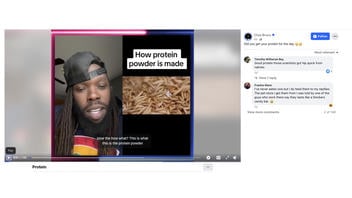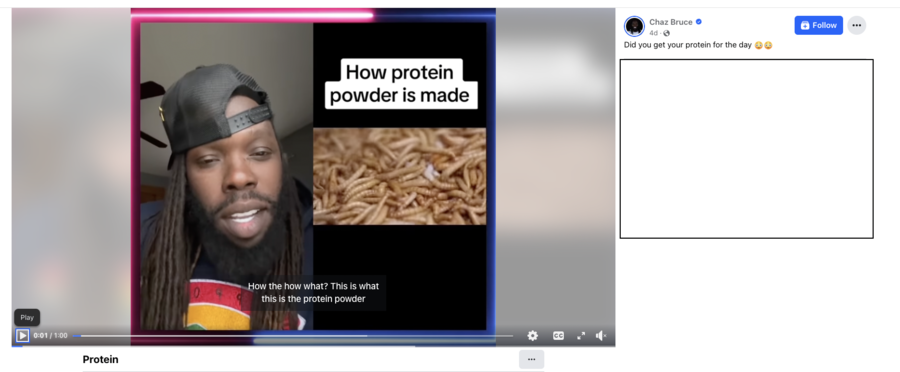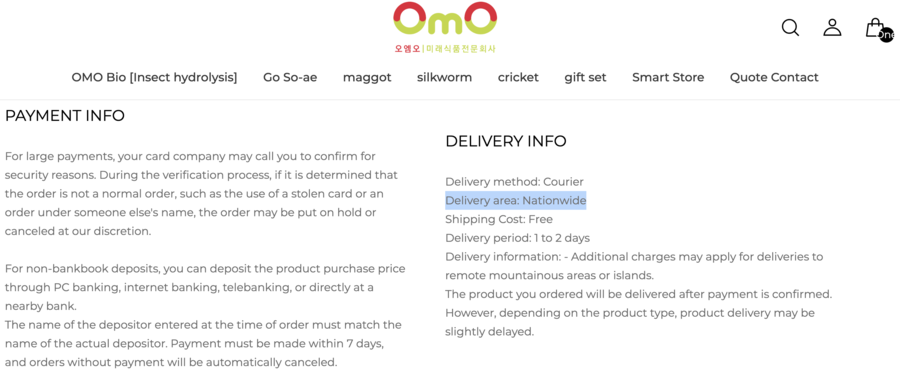
Does a viral video on Facebook prove that all protein powder is made from maggots? No, that's not true: The footage captures a single facility in South Korea that produces mealworm flour for human consumption. Most types of commercially available protein powder in the United States is made from other ingredients such as milk or plants.
The claim reappeared in a video (archived here) on Facebook on March 30, 2024, under the title:
How protein
powder is made
At the 0:22 mark, a male commentator seen in the clip commenting on a video on the right side of the screen said:
That's maggots? They get the protein from the maggots? That's wow, bro. You be putting it into your milkshakes at the gym!
This is what the post looked like on Facebook at the time of writing:
(Source: Facebook screenshot taken on Wed Apr 3 14:46:49 2024 UTC)
The post implied that all commercially available protein powder is made from maggots. That does not accurately reflect reality.
What is protein powder?
A flour-like substance, protein powder is a dietary supplement that contains protein extracted from different sources such as cow's milk, eggs, peas, rice or soy. Emily Gelsomin (archived here), a registered dietitian and senior clinical nutrition specialist at Massachusetts General Hospital, wrote on the Harvard Medical School website (archived here) in 2020:
During processing, naturally occurring carbohydrates, fats, minerals, and fiber are often removed, while supplementary nutrients, herbs, and even sweeteners may be added.
Depending on the source of protein, the nuances of the production technology may vary, but the major components remain the same: heat and acid (archived here).
According to MedlinePlus (archived here), an informational resource of the National Library of Medicine, whey protein powder (archived here), which appears to occupy a significant market share (archived here) in the United States, is made of "the watery portion of milk that separates from the curds when making cheese."
The footage from the post on Facebook did not portray any of that.
The video
The sped-up clip the man in the post was making comments about appeared to show an industrial facility where some bugs were being dried on large trays and later turned into powder.
A reverse image search revealed that the original upload (archived here) was published on YouTube on March 16, 2022, under the title:
It was a much longer, better-quality video with several shots (for example, here and here) capturing the name of the company whose facility was filmed: Omo. According to its website (archived here), it is located in the southern part of South Korea (archived here).
Omo's specialty is insect-based snacks and dietary supplements for human consumption.
While the subtitles in the video on YouTube mentioned that the company exports its products to the United States, Omo's website did not contain a button allowing users to switch from Korean to English.
The information posted under the products reviewed by a Lead Stories reporter through automated Chrome translation did not say anything about the availability of international shipping:
(Source: Omo screenshot taken on Thu Apr 4 15:52:20 2024 UTC)
Lead Stories contacted Omo for further comment. If we receive a response, this section will be updated as appropriate.
Claim's origin
The implied claim about all protein powder purportedly made from maggots has been online at least since 2022.
On September 7, 2022, an Arabic-language account of Tetouanpost republished a shorter, cropped version of the original footage (archived here), omitting any references to South Korea. Tetouanpost, according to the automated Chrome translation, describes itself (archived here) as "a regional electronic newspaper that deals with news from Morocco in general and the North in particular, and brings you the news as it happens."
DeepL (archived here) translated the Arabic title of that upload as "Video: Making protein from worms"; Google Translate (archived here) offered a slightly different version: "Dangerous video: making protein from worms."
This clip did not explicitly mention protein powder or say that all products of this type are made from worms. Yet, this was the version of the footage reused by social media accounts making the claim that is the focus of this fact check.
One of the earliest examples found by Lead Stories was published on X, formerly known as Twitter, by a Turkish-language account (archived here) on September 17, 2022. On the next day, it appeared on TikTok (archived here).
Other Lead Stories fact checks about health can be found here.



















